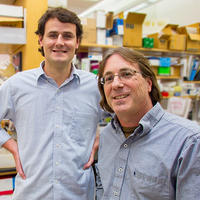New understanding of genetic replication could help in the fight against cancer
A new line of research from a team at Florida State University is pushing the limits on what the world knows about how human genetic material is replicated and what that means for people with diseases where the replication process is disrupted, such as cancer.

David Gilbert, professor in the Department of Biological Science, and Ben Pope, postdoctoral researcher at Florida State.
The team, led by Department of Biological Science Professor David Gilbert and postdoctoral researcher Ben Pope, has taken an in-depth look at how DNA and the associated genetic material replicate and organize within a cell’s nucleus. Their work could be especially crucial for doctors and medical researchers who have found that the replication process is typically disrupted in cancer patients.
“Why does this process exist? Why is it awry in diseases? That’s why this research is important for us as a society,” Gilbert said.
The paper, appearing in the Nov. 19 edition of the journal Nature, sheds light on a subject that is poorly understood by researchers worldwide and naturally of great interest because of the future advances that can occur with breakthroughs.
Pope and Gilbert’s paper is a companion piece to a bigger, multi-university project called ENCODE, funded by the National Institutes of Health. The multi-university effort offered a comprehensive review of the mouse genome and found many similarities and differences with the human genome.
In addition to their own paper on DNA replication, Pope and Gilbert are also listed as contributors to the ENCODE piece.
In their work, Pope and Gilbert examined the replication process in detail so they could identify the units by which the genetic material replicated. They knew it happened at regular intervals, but they needed to know where the boundaries were.
“The fundamental first step in understanding a new phenomenon in nature is to identify the units of regulation, and we finally have that,” Gilbert said.
Scientists believe continued research in this area could lead to novel treatment options for cancer patients and those that could benefit from stem cell-based therapies.
“The process is well conserved in many species, suggesting it’s critical,” Pope said, “but we really don’t know why. More research will help us understand why this process is disrupted in cancer and other diseases.”
The current research is funded by the National Institutes of Health. In addition to Gilbert, Pope worked closely with New College Assistant Professor Tyrone Ryba, previously a graduate student in Gilbert’s lab. Other researchers from Florida State include Assistant Professor Jonathan Dennis and graduate students Daniel Vera and Vishnu Dileep.

